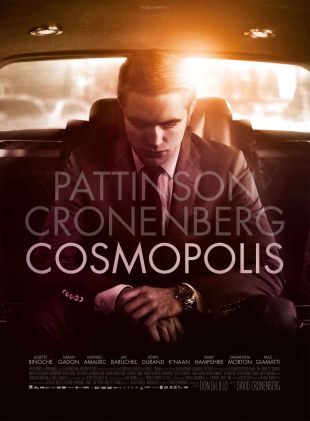/Cosmopolis/_derived_jpg_q90_584x800_m0/cosmopolis_6.jpg)
In David Cronenberg's adaptation of Don DeLillo's novel Cosmopolis, Manhattan billionaire Eric Packer (Robert Pattinson) finds his attempt to get a haircut from his father's old barber complicated by a presidential motorcade, a violent uprising, and a funeral procession for a famous hip-hop star. Meanwhile, the wealthy 28-year-old's vast fortune hinges on his assessment of the yuan, which he continually monitors from the comfort of his stretch limo. Whether it's a result of Cronenberg's unusually direct approach, the fact that the story has as much momentum as the traffic jam that hinders Eric's obsessive quest, or the realization that endless ramblings by uninteresting characters just don't make for very good cinema, Cosmopolis comes off as a clumsy, tedious, and woefully heavy-handed strike at the heart of capitalism, and displays precious little of the morbid nuance that the director has so effectively nurtured over the past four decades.
There's a troubling tendency among some critics and moviegoers to assume that just because we have stumbled into the light scratching our heads after a film that surely we must have just witnessed a piece of art so intellectually superior that we, the humble consumers, are merely too thick to "get it." In the case of directors such as Cronenberg, it's only natural that we'd want to give them the benefit of the doubt. Since the beginning, he has excelled at using abstract concepts and images to confront social trends that alter the ways we live and communicate. But in Cosmopolis -- a ponderous mess of philosophical musings related to the Occupy movement and intrinsically tied to an asymmetrical colon -- he allows concept to take precedence over execution, and misses a major opportunity to address prescient issues effectively. He's got plenty to say, but he chooses to convey his message in a way that's so completely disengaging our eyes start to glaze over as the intended criticism of capitalism run amok gets lost in the ether. So vapid and excruciatingly long-winded is Cronenberg's critique of the so-called "One Percenters" that we have little choice but to shrink away and tune out.
/Cosmopolis/_derived_jpg_q90_584x800_m0/cosmopolis_2.jpg)
Nestled comfortably in the cocoon of his high-tech stretch limo like an obscenely rich Captain Kirk, Twilight heartthrob Pattinson seems intent on summoning Patrick Bateman-style detachment as Packer, but turns in a performance so wooden that we're never convinced he's the financial whiz every supporting character claims him to be ad nauseum. At the same time, one can only surmise that the dead-eyed acting was intentional since it's echoed by virtually everyone in the cast (with the exceptions of Paul Giamatti and Kevin Durand, the latter contributing a much needed dose of dry humor to the proceedings).
In the past, Cronenberg has used such deadpan performances to striking effect -- Peter Weller in Naked Lunch comes to mind -- but in the case of Cosmopolis, the approach just leaves a giant vaccum in the soul of the celluloid. We get it: Packer is so petrified by the concept of imperfection that he will stubbornly allow his entire empire to crumble (perhaps purposefully) before he will even take chaos into consideration, and he's grown so obscenely wealthy that he realizes there's nowhere to go but down.

As a young filmmaker, Cronenberg sparked our synapses by using the horrors of the abstract to address troubling social developments, and even though he's become a bit more direct as of late, his tendency toward rich subtexts and evocative imagery offer continued proof of his talent as a true cinematic visionary. At one point in Cosmopolis, a sign reads, "A specter is haunting the world. The specter is capitalism." The quote conjures an eerie flash of mental imagery that would have been perfect fodder for the Cronenberg who gave us They Came From Within and The Brood. Perhaps by terrifying us, he would have actually engaged us as well. As it stands, the only specter here is that of a missed opportunity.
